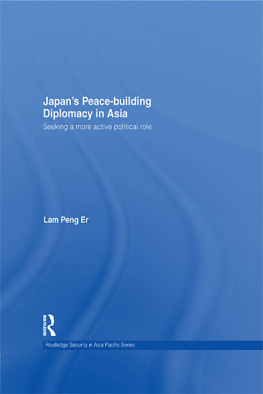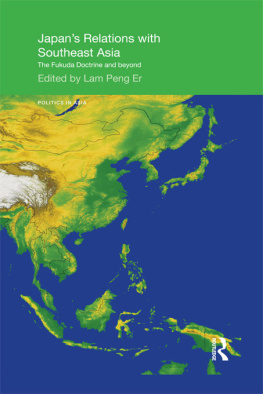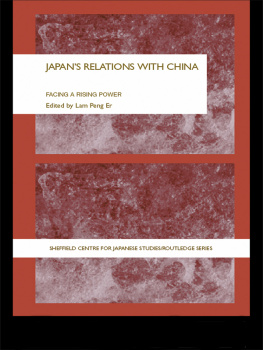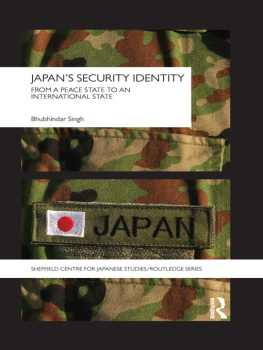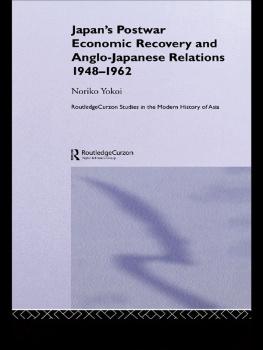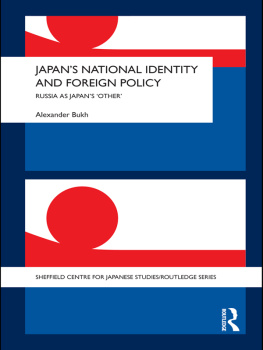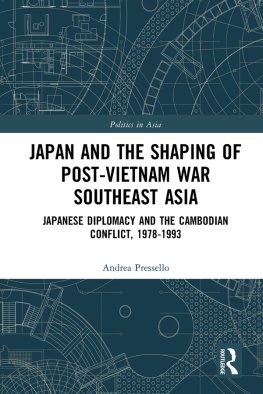Japans Peace-building Diplomacy in Asia
The conventional portrayal of Japans role in international affairs is of a passive political player which despite its position as the worlds second largest economic power punches below its weight on the world stage: its foreign policy driven by Washington, mercantilism and constrained by domestic pacifism. This book examines Japans emerging identity as an important participant in conflict prevention and peace-building in Southeast and South Asia, demonstrating that Japan has increasingly sought a positive and active political role commensurate with its economic pre-eminence.
The book considers Japanese involvement in many of the regions most serious recent conflicts: including Japans part in the brokering and maintaining of peace in Cambodia, which in 1992 saw the first dispatch of troops abroad by Tokyo since the end of World War II, and the attempts to bring peace to Aceh, Sri Lanka, East Timor and Mindanao. The Japanese example, when compared with other countries prominent in the fields of conflict prevention, suggests that Tokyo given its pacifist strategic culture relies on diplomacy and Official Development Assistance rather than peace enforcement through military means.
Overall, this book provides a lucid appraisal of Japans overall foreign policy, as well as its new role in conflict prevention and peace-building analyzing the reasons behind this shift towards an active international role and assessing the degree of success it has enjoyed.
Lam Peng Er is a Senior Research Fellow at the East Asian Institute, National University of Singapore. His books include Green Politics in Japan and Japans Relations with China: Facing a Rising Power (both published by Routledge).
Routledge security in Asia Pacific series
Series Editors
Leszek Buszynski
International University of Japan
and
William Tow
Australian National University
Security issues have become more prominent in the Asia Pacific region because of the presence of global players, rising great powers, and confident middle powers, which intersect in complicated ways. This series puts forward important new work on key security issues in the region. It embraces the roles of the major actors, their defense policies and postures and their security interaction over the key issues of the region. It includes coverage of the United States, China, Japan, Russia, the Koreas, as well as the middle powers of ASEAN and South Asia. It also covers issues relating to environmental and economic security as well as transnational actors and regional groupings.
1 Bush and Asia
Americas evolving relations with East Asia
Edited by Mark Beeson
2 Japan, Australia and Asia-Pacific Security
Edited by Brad Williams and Andrew Newman
3 Regional Cooperation and Its Enemies in Northeast Asia
The impact of domestic forces
Edited by Edward Friedman and Sung Chull Kim
4 Energy Security in Asia
Edited by Michael Wesley
5 Australia as an Asia Pacific Regional Power
Friendships in flux?
Edited by Brendan Taylor
6 Securing Southeast Asia
The politics of security sector reform
Mark Beeson and Alex J. Bellamy
7 Pakistans Nuclear Weapons
Bhumitra Chakma
8 Human Security in East Asia
Challenges for collaborative action
Edited by Sorpong Peou
9 Security and International Politics in the South China Sea
Towards a co-operative management regime
Edited by Sam Bateman and Ralf Emmers
10 Japans Peace-building Diplomacy in Asia
Seeking a more active political role
Lam Peng Er
11 Geopolitics and Maritime Territorial Disputes in East Asia
Ralf Emmers
Japans Peace-building Diplomacy in Asia
Seeking a more active political role
Lam Peng Er

LONDON AND NEW YORK
First published 2009
by Routledge
2 Park Square, Milton Park, Abingdon, Oxon OX14 4RN
Simultaneously published in the USA and Canada
by Routledge
270 Madison Ave, New York, NY 10016
Routledge is an imprint of the Taylor & Francis Group, an informa business
This edition published in the Taylor & Francis e-Library, 2009.
To purchase your own copy of this or any of Taylor & Francis or Routledges collection of thousands of eBooks please go to www.eBookstore.tandf.co.uk.
2009 Lam Peng Er
All rights reserved. No part of this book may be reprinted or reproduced or utilized in any form or by any electronic, mechanical, or other means, now known or hereafter invented, including photocopying and recording, or in any information storage or retrieval system, without permission in writing from the publishers.
British Library Cataloguing in Publication Data
A catalogue record for this book is available from the British Library
Library of Congress Cataloging-in-Publication Data
Er, Lam Peng, 1959
Japans peace-building diplomacy in Asia: seeking a more active political role/Lam Peng Er.
p. cm. (Routledge security in Asia Pacific series)
Includes bibliographical references and index.
1. Peace-buildingJapan. 2. Peace-buildingAsia. 3. JapanForeign relationsAsia. 4. AsiaForeign relationsJapan. I. Title.
JZ5594.J3E7 2009
327.1720952dc22 2008048283
ISBN13: 978-1-134-12505-0 ePub ISBN
ISBN10: 0-415-41320-6 (hbk)
ISBN10: 0-203-87781-0 (ebk)
ISBN13: 978-0-415-41320-6 (hbk)
ISBN13: 978-0-203-87781-4 (ebk)
Series editors preface
Western critics have often lamented what they have described as the passivity of Japanese foreign policy and Tokyos unwillingness to take greater responsibility for Asian and global security. The refrain is that Japan has been too narrowly focused on its own interests and excessively reliant upon the US in a way which has created a reluctance to assume greater security burdens. Japans positive contributions to Asian security often go unnoticed, however. As Dr. Lam stresses in this volume, Japan has placed great importance on peace-building to strengthen Asian security, but its efforts do not attract the attention they deserve. Peace-building may not appear to be an exciting process; its difficulties, dilemmas and subsequent successes may not reach the headlines, but it has become an essential means of bringing lasting security to wartorn countries and troubled regions.

